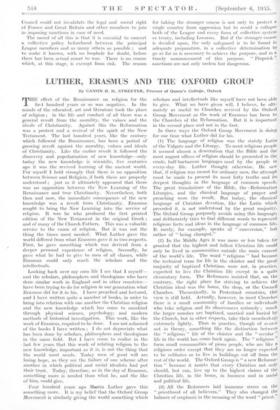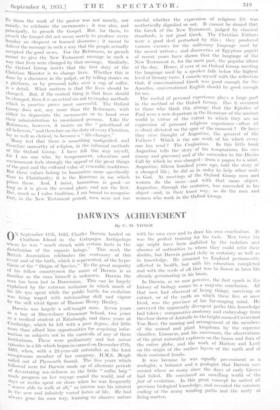LUTHER, ERASMUS AND THE OXFORD GROUP
Ey CANON B. H, STREETER, Provost of Queen's College, Oxford
THE effect of the Renaissance on religion for the fin t hundred years or so was negative. In the minds of the educated, art and literature took the place of religion ; in the life and conduct of all there was a general revolt from the morality, the values and the ideals of Christianity. Against this the Reformation was a protest and a revival of the spirit of the New Testament. The last hundred years, like the century which followed the Renaissance, has been a period of growing revolt against the morality, values and ideals of Christianity. Like the earlier revolt it followed the discovery and popularisation of new knowledge—only today the new knowledge is scientific, five centuries ago it was the revived learning of the ancient world. For myself I hold strongly that there is no opposition between Science and Religion, ,if both these are properly understood ; just as it ultimately appeared that there was no opposition between the New Learning of the Renaissance and true Christianity. Nevertheless, both then and now, the immediate consequence of the new knowledge was a revolt from Christianity. Erasmus sought to bring the New Learning into the service of religion. It was he who produced the first printed edition of the New Testament in the original Greek ; and of many of the Church Fathers. This was a valuable service to the cause of religion. But it was not the thing the times most needed.' What Luther gave the world differed from what Erasmus gave it in two respects. First, he gave something which was derived from a deeper personal experience of religion. Secondly, he gave what he had to give to men of all classes, while Erasmus could only reach the scholars and the intellectuals.
Looking back over my own life I see that I myself— and the scholars, philosophers and theologians who have done similar work in England and in other countries— have been trying to do for religion in our generation what Erasmus did for it in his. I have preached and lectured, and I have written quite a number of books, in order to bring into relation with one another the Christian religion and the new knowledge which has come to mankind through physical science, psychology,- and modern methods of historical investigation. This work, like the work of Erasmus, required to be done. I am not ashamed of the books I have written ; I do not depreciate what has been done by scholars, philosophers and theologians in the same field. But I have come to realise in the • last few years that this work of' relating religion to the new knowledge, important as it is, is not the thing that the world most needs. Today men of good will are losing hope, as they see the failure of one scheme after another in which political and social idealists had put their trust. Today, therefore, as in the day of Erasmus, something more is needed than what he, and the like of him, could give.
Four hundred years ago Martin Luther gave this something more. It is my belief that the Oxford Group Movement is similarly giving the world something which scholars and intellectuals like myself have not been able to give. What we have given will, I believe, be ulti- mately as useful to Churches revived by the Oxford Group Movement as the work of Erasmus has been to the Churches of the Reformation. But it is important in the second place and not in the first.
In three ways the Oxford Group Movement is doing for our time what Luther did for his.
(1) The language of religion was the stately Latin of the Vulgate and the Liturgy. To most religious people it seemed almost a desecration that the Bible and the most august offices of religion should be presented in the crude, half-barbarous languages used by the people in every-day life. Luther thought otherwise. He saw that, if religion was meant for ordinary men, the attempt must be made to present its most lofty truths and its deepest thoughts in the language of common speech.
The great translations of the Bible, the • Reformation Liturgies, and the classical language of prayer and preaching were the result. But today, the classical language of Christian devotion, like the Latin which preceded it, is not understood by the great majority.
The Oxford Group purposely avoids using this language, and deliberately tries to find different words to represent religious facts and ideas in the language of common life. It rarely, for example, speaks of conversion," but rather of " being changed."
(2) In the Middle Ages it was more or less taken for granted that the highest and fullest Christian life could only be lived in communities outside the main current of the world's life. The word " religious " had become the technical term for life in the cloister and the great majority of baptized Christians were not, in practice, expected to live the Christian life except in a quite elementary form. The Reformers insisted that, on the contrary, the right place for striving to achieve the Christian ideal was the home, the shop, or the Council Chamber. Theoretically, in Protestant countries, this view is still held. Actually, however, in most Churches there is a small community of families or individuals who take religion and its observances seriously ; much the larger number are baptized, married and buried by the Church, but in other respects, take their memberh sip extremely lightly. Thus in practice, though of course not in theory, something like the distinction between the " religious " life of the cloister and the " secular life in the world has come back again. The " religious form small communities of pious people, who are like a religious order except that they are no longer expected to be celibates or to live in buildings cut off from the rest of the world. The Oxford Group is " a new Reforma- tion " because it insists that every Christian not only should, but can, live up to the highest claims of the Christian life, in the home, in business and in social and political life.
(8) All the Reformers laid immense stress on the " priesthood of all believers." • They also changed the balance of emphasis in the meaning of the word " priest.' To them the work of the .pastor was not merely, nor mainly, to • celebrate the sacraments ; it was also, and principally; to preach the Gospel. But, for them, to preach the Gospel did not mean merely to produce every Sunday an eloquent or learned discourse ; it meant to deliver the message in such a way that the people actually accepted the good news. For. the Reformers, to preach meant, to give the New Testament message in such a Way that lives were changed by that message. Similarly, the Oxford Group insists that the first duty of the Christian Minister is to change lives. Whether this is done by a discourse in the pulpit, or ,by telling stories on a platform, or by personal talks over a cup of coffee, Is a detail. 'What matters ..is that the lives should be changed. But, if the central thing is that lives should he'ehtiriged,-then it is an actual sin not to employ methods Irhich in practice prove most successful. The Oxford Group does not, any more than the Reformers, wish either-to depreciate the sacraments or to hand over their administration to unordained persons. Like the Reformers, however, it insists on the " priesthood of all believers," and therefore on the duty of every Christian, lay as well as clerical, to become a " life-changer."
Many feel that there is something undignified, and therefore unworthy of religion, in the informal methods of the Oxford Group. I have felt this way myself, for 'I am one who, by temperament, education and environment feels strongly the appeal of the great things of the past and the cultural value of venerable traditions. But these values belong to humanism more specifically than to Christianity; it is the Erasmus in me which .prizes these. And, I insist, humanism is good—so long as it is given the second place, and not the first. But, much as I value tradition, I am bound to recognise qtrt, in the New Testament period, men were not too careful whether the expression of religious life was aesthetically dignified or not. It cannot be denied that the Greek of the New Testament, judged by classical standards, is not good Greek. The Christian Fathers were a , good deal perturbed by this ; they produced various excuses for - the unliterary language used by the sacred writers ; and discoveries of Egyptian papyri of recent years have • shown that the language of the New Testament is, for the most part, the popular idiom of the day. Hence, if ever at an Oxford Group meeting the language used by a speaker falls below the highest . level of literary taste, I console myself with the reflection that, if conversational Greek was good enough for the Apostles, conversational English should be good enough for me.
The recital of personal experience plays a large part in the method of the Oxford Group. Has it occurred to those who think this strange that the Epistles ' of Paul were a new departure in the literature of the ancient world in virtue of the extent to which they are an expression of personal religious experience—often (it is clear) dictated on the spur of the moment ? Or have they ever thought of Augustine, the greatest of the Fathers ? Which is the one work of his which every one has read ? The Confessions. In this little book Augustine tells the storyof his temptations, his sins (many and grieVous) and of the surrender to the Divine Call by which he was changed—from a pagan to a saint. Augustine, fifteen hundred years ago, told the story of a changed life ; he did so in order to help other souls to God. At meetings of the Oxford Group men and women do the same—and with that same object. Augustine, through the centuries, has succeeded in his object-Land, in their lesser way, so do the men and women who work in the Oxford Group.







































 Previous page
Previous page